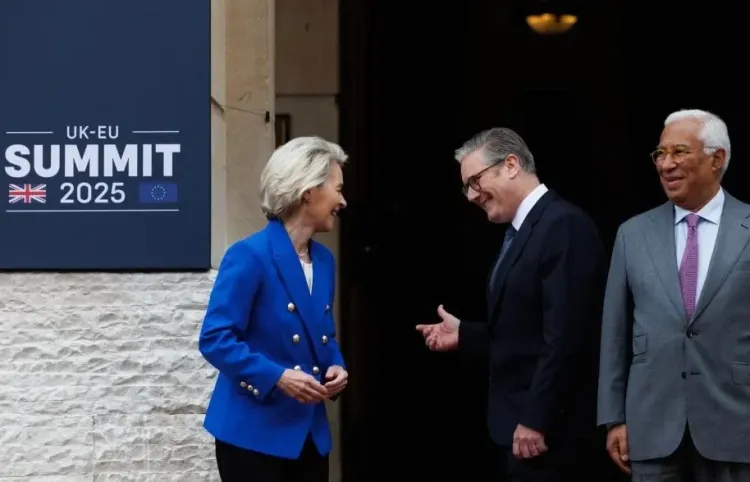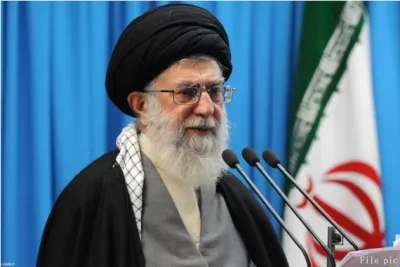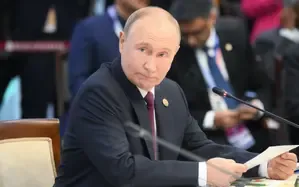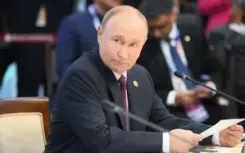Have UK-EU Relations Been Reset with a New Bilateral Agreement?

Synopsis
Key Takeaways
- UK-EU deal projected to generate £9 billion by 2040.
- New youth mobility scheme to enhance cultural ties.
- SPS agreement to ease food trade and cut costs.
- 12-year fisheries framework preserves access for British fishers.
- Improved travel for British tourists through eGate access.
London, May 20 (NationPress) The United Kingdom and the European Union (EU) have finalized a comprehensive agreement that is projected to contribute approximately £9 billion (around $12.02 billion) to the UK economy by 2040, as stated by Downing Street.
The deal was revealed just before the inaugural UK-EU summit taking place in London, a gathering celebrated by both parties as a momentous occasion. European Commission President Ursula von der Leyen referred to this agreement as a new chapter in UK-EU relations, as both sides aim to mend ties following years of post-Brexit tensions.
Hosted by Prime Minister Keir Starmer, the summit included von der Leyen and European Council President Antonio Costa. All participants lauded the agreement as a significant advancement during a joint press briefing, as reported by Xinhua news agency.
A key feature of the deal is a youth mobility program, characterized by Downing Street as capped and time-limited, and modeled after similar arrangements with nations such as Australia and New Zealand. The UK and EU are also set to collaborate on reinstating British participation in the Erasmus+ academic exchange initiative, from which the UK withdrew during the ongoing 2021-2027 cycle.
Von der Leyen emphasized that the mobility initiative aims to restore long-lasting academic and cultural ties between European and British youth.
The agreement also encompasses a sanitary and phytosanitary (SPS) arrangement designed to facilitate trade in food and agricultural products. It will eliminate numerous routine inspections on animal and plant commodities, thereby reducing costs, minimizing bureaucratic hurdles, and reopening EU markets to British exports like burgers and shellfish. Additionally, it will simplify the movement of goods between Britain and Northern Ireland under the Windsor Framework.
Starmer stated, “This deal reduces bureaucratic barriers for exporters and will lower food prices in British supermarkets.” He added, “It directly benefits working individuals across the nation.”
In the fisheries domain, the UK and EU have established a 12-year framework that safeguards British access to EU waters while maintaining existing quotas for EU vessels. The UK government plans to invest £360 million to modernize its fishing fleet and enhance technology.
Starmer remarked, “Previously, we shifted to annual negotiations, causing instability. This new agreement provides predictability. Over 70 percent of our seafood is sold to the EU, so minimizing bureaucratic barriers is crucial.”
The agreement also sets the foundation for defense and security collaboration, including a framework for the UK’s involvement in the EU’s SAFE defense initiative, which supports joint military procurement. Ongoing discussions will address financial contributions and supply chain logistics.
Moreover, British tourists stand to gain from this deal. It will broaden access to Europol data and improve cooperation on biometric and vehicle information. British travelers will once again have the opportunity to use eGates at EU border checks, expediting passport verification.
Despite widespread endorsement, the agreement has attracted criticism. Opposition Conservative Party leader Kemi Badenoch vowed to reverse it if her party regains power, while Nigel Farage of Reform UK labeled the decision a capitulation to Brussels.
Fisheries organizations have also expressed dissatisfaction. The National Federation of Fishermen's Organisations stated the agreement “sacrifices our strongest position,” benefiting larger exporters and supermarkets more than independent fishers.
Nonetheless, analysts view the agreement as a pragmatic advancement.
“Fishing constitutes a minor segment of the British economy, but critics will seize upon it as symbolic,” remarked Iain Begg, a European politics scholar at the London School of Economics and Political Science. “However, lessening barriers to UK exports carries significantly greater economic significance—especially for defense contractors poised to benefit from EU military procurement.”
Regarding the mobility aspect, Begg noted that relaxed passport regulations would be appreciated by many Brits, particularly with the holiday season approaching.
While some opponents perceive the agreement as a British concession, others contend it signifies a more mature stage in UK-EU interactions.
“If you view this as a situation of winners and losers, you overlook the broader context,” commented Steve Nolan, a senior economics lecturer at Liverpool John Moores University, who interprets the move as a mutual acknowledgment that “we are close neighbors and strategic allies.” In a fragmented world, this represents a sign that “mature negotiations are back on the agenda.”
No specific timeline has been established for the full implementation of the agreement, but Starmer indicated that remaining discussions would proceed “with the same urgency and focus.” (1 British pound = $1.34)









